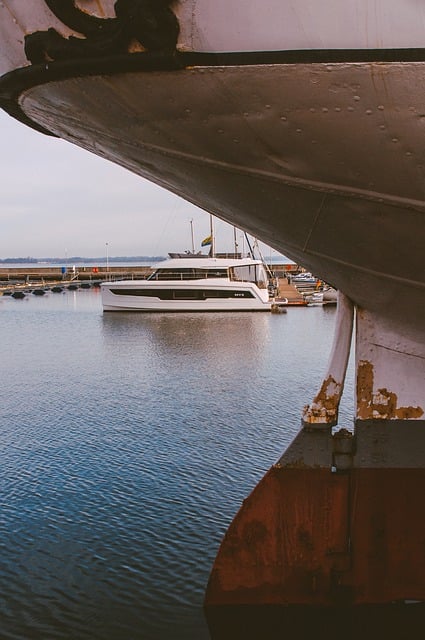The maritime industry is transitioning to eco-friendly marine batteries, driven by environmental imperatives and technological advancements. Traditional lead-acid batteries, which have long been used due to their cost-effectiveness, are being replaced by modern lithium-ion marine batteries due to their superior performance, environmental benefits, and reduced weight and space requirements. These new batteries offer increased energy density, longer operational lifespans, and higher efficiency, all of which are critical for maritime applications. The shift towards sustainable marine battery technology, exemplified by the adoption of nickel-metal hydride (NiMH) and sodium-ion technologies, not only enhances performance but also supports the industry's commitment to sustainability by minimizing environmental impact. Recent innovations have significantly improved energy density and operational efficiency, extending cruise times and reducing fuel consumption and emissions, which align with global environmental standards and economic incentives aimed at promoting greener energy solutions in maritime operations. The evolution of marine battery technology is a testament to the sector's commitment to sustainable development, ensuring that the industry can grow without leaving an ecological imprint, while also opening new market segments and stimulating innovation within the maritime domain.
Navigating the oceans’ vast expanse necessitates energy solutions that are as boundless and resilient as the marine environments they power. The critical need for sustainable technology in maritime operations has propelled the evolution of marine batteries from traditional lead-acid to cutting-edge lithium-ion systems, revolutionizing their performance and longevity. This article delves into the transformative advancements in marine battery technology, emphasizing the role of sustainable materials and energy density improvements that extend cruise times and reduce environmental footprints. It also explores the regulatory landscape shaping these innovations, ensuring a greener future for the maritime industry’s power needs. Join us as we chart the course towards a cleaner ocean journey through eco-friendly marine battery solutions.
- Understanding the Necessity for Green Technology in Marine Batteries
- The Evolution of Marine Battery Technologies: From Lead-Acid to Lithium-Ion
- The Role of Sustainable Materials in Enhancing Marine Battery Performance
- Advancements in Energy Density and Efficiency for Longer Cruise Times
- Regulatory Frameworks and Incentives Fostering Eco-Friendly Innovations in the Maritime Industry
Understanding the Necessity for Green Technology in Marine Batteries

The imperative for eco-friendly innovations in marine batteries is driven by a confluence of environmental concerns and technological advancements. As maritime activities continue to expand, the demand for reliable power sources that can operate in harsh conditions without compromising ecological integrity grows. Traditional lead-acid batteries have long been the staple for powering vessels, but their environmental impact is undeniable, with significant contributions to pollution through leakage of hazardous substances and their disposal. In contrast, modern marine batteries, particularly those harnessing lithium-ion technology, offer a cleaner alternative. These advanced batteries are not only lighter and more compact but also boast greater energy density, which means they can store more power for the same weight, a critical advantage for marine applications. Moreover, their longevity reduces the frequency of replacement, thereby minimizing waste. The transition to eco-friendly marine batteries is not just a matter of environmental stewardship; it also represents a commitment to sustainable development within the maritime sector, ensuring that the industry can continue to thrive without leaving an environmentally damaging footprint. As such, the push for green technology in marine batteries is a beacon of progress, signaling a shift towards more responsible and sustainable energy solutions at sea.
The Evolution of Marine Battery Technologies: From Lead-Acid to Lithium-Ion

Marine batteries have undergone a significant evolution, transitioning from traditional lead-acid designs to the advanced lithium-ion technology that is currently leading the charge in eco-friendly maritime energy solutions. The journey from lead-acid batteries began with their widespread adoption due to their availability and cost-effectiveness. These batteries, while reliable, were heavy, required frequent maintenance, and had a relatively low energy density compared to their size. Their lead content also posed environmental concerns, making them less sustainable than desired for the modern mariner focused on preserving aquatic ecosystems.
In recent years, lithium-ion marine batteries have emerged as a transformative innovation, addressing many of the limitations present in their predecessors. These new-age batteries are significantly lighter, offering increased energy density and improved performance. Their design minimizes environmental impact, as they lack the hazardous materials found in lead-acid batteries. Moreover, lithium-ion marine batteries are more efficient, with the ability to handle deep discharges without compromising their lifespan or capacity. This evolution represents a leap forward in sustainable power solutions for the maritime sector, aligning with the global push towards eco-conscious technologies that reduce the carbon footprint and protect the oceans from pollution.
The Role of Sustainable Materials in Enhancing Marine Battery Performance

Marine batteries, a cornerstone in the operational efficiency of aquatic vessels, are undergoing significant advancements through the integration of sustainable materials. The performance of these batteries is pivotal for applications ranging from small boats to large commercial ships, and their enhancement is crucial for the environmental sustainability of maritime activities. Sustainable materials such as lithium-ion, with its high energy density, are being explored and implemented to replace traditional lead-acid batteries due to their lower environmental impact and longer lifespan. These advanced materials not only improve the battery’s capacity but also its durability under the corrosive conditions found in marine environments. Additionally, the use of nickel-metal hydride (NiMH) and sodium-ion technologies is on the rise, offering lighter weight options that reduce the overall environmental footprint of the vessel. The evolution of marine batteries through sustainable materials is not only a step towards cleaner seas but also a move towards more resilient and efficient energy solutions for maritime transport, which is essential for maintaining the health of our oceans and promoting eco-friendly innovation in this critical sector.
Advancements in Energy Density and Efficiency for Longer Cruise Times

Advancements in marine battery technology have significantly improved energy density and efficiency, enabling longer cruise times for maritime vessels. The development of high-capacity batteries has been pivotal in this regard, as they store more energy in a given volume or weight compared to their predecessors. This leap in capacity allows for extended operational periods without the need for frequent recharging, which is particularly beneficial for applications ranging from commercial shipping to recreational boating. The focus on sustainability within the maritime industry has led to rigorous research and development efforts aimed at optimizing battery performance. Lithium-ion technology, in particular, has seen enhancements that not only increase the amount of energy a battery can hold but also decrease its self-discharge rate, ensuring a longer usable life. These advancements are not only crucial for operational efficiency but also for reducing the environmental impact of marine activities. As marine batteries become more efficient and eco-friendly, they contribute to a significant reduction in fuel consumption and associated emissions, making them an indispensable component in the shift towards greener maritime operations. The evolution of marine battery systems is closely tied to the growing demand for cleaner energy solutions, and as this technology continues to advance, we can expect to see even greater improvements in the range and performance capabilities of electric and hybrid maritime vessels.
Regulatory Frameworks and Incentives Fostering Eco-Friendly Innovations in the Maritime Industry

The maritime industry’s transition to eco-friendly practices is significantly bolstered by a robust set of regulatory frameworks and incentives designed to promote innovation in marine battery technology. Governments worldwide have implemented stringent environmental regulations that mandate the reduction of harmful emissions from maritime operations, which has pushed the industry towards cleaner energy sources. These regulations often specify the adoption of advanced marine batteries as a key solution for powering vessels sustainably, thereby incentivizing manufacturers and operators to invest in this technology. Moreover, financial incentives such as subsidies, tax rebates, and research grants are provided to encourage the development and deployment of more efficient and less polluting marine battery systems. These measures not only contribute to environmental conservation but also drive economic growth by creating new market opportunities and fostering innovation within the maritime sector.
The effectiveness of these regulatory measures is further augmented by collaborative initiatives between industry stakeholders, environmental organizations, and research institutions. These partnerships facilitate knowledge sharing and the advancement of marine battery technologies through joint research projects. The focus on R&D leads to breakthroughs in energy density, lifespan, and recyclability, which are critical for the widespread adoption of marine batteries. As a result, the maritime industry is steering towards a greener future with the support of comprehensive regulations and compelling economic incentives that prioritize sustainable practices and eco-friendly innovations.
marine battery advancements are charting a greener course for the maritime industry. With the global shift towards sustainable practices, the necessity for eco-friendly innovations in marine batteries is paramount. The evolution from lead-acid to lithium-ion technologies has been a transformative journey, markedly enhancing performance and efficiency while significantly reducing environmental impact. The strategic use of sustainable materials has further propelled this progress, paving the way for longer cruise times and cleaner oceans. Regulatory support and economic incentives are catalyzing these changes, ensuring that the maritime sector remains at the forefront of eco-innovation. As we look to the future, it is clear that marine batteries will continue to play a crucial role in safeguarding our planet’s health, setting a standard for green technology across all sectors.